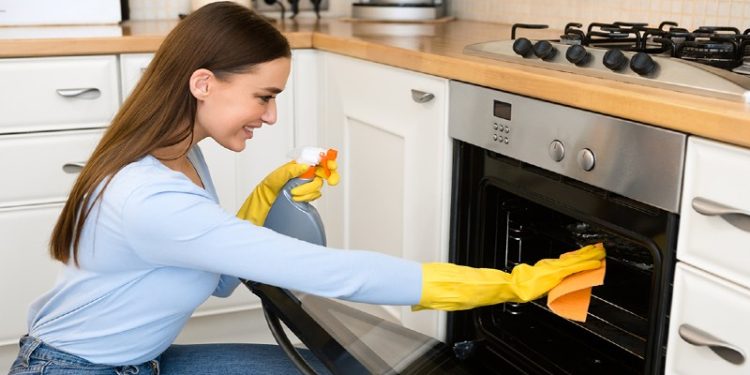The importance of kitchen hygiene extends far beyond the context of a pandemic. The kitchen is the hub of your home, where you host guests and celebrate milestones, but it can also quickly become a breeding ground for viruses, clutter, and filth. By making some changes to your kitchen layout, you may make it simpler to keep it clean and reduce the breeding ground for germs. So, if you are wondering how to clean microwave, cabinets, and other areas, follow these guidelines for an antibacterial kitchen and other clean kitchen ideas to keep the hub of your house germ-free.
Hacks to Achieving a Germ-Free Kitchen
-
Organize the Counter
Although it's quite evident, you may be astonished to discover how our counter gradually becomes crowded with gadgets, jars, bottles, and other stuff. One might argue that having everything out for easy access is a plus, but cleaning becomes a breeze when nothing has to be moved. There's more room for ingredients and utensils to be spread out and misplaced while you cook. If the items don’t fit on the counter, then at least pile everything onto a single tray so you can transfer it all as a unit if necessary.
-
Constantly Wash Your Hands
The first and most important rule of food preparation is always to wash your hands. Your hands are continuously exposed to potentially hazardous microorganisms from the many different surfaces and activities you engage in.
For example, if you're preparing raw fruits and veggies for a salad, you may be certain that your salad won't get contaminated if you only wash your hands.
-
Dispose of Garbage Every Day
Raw food that has been thrown away will decay quickly. Rotting food smells terrible, harbors germs, and attracts insects and animals like ants, roaches, and rodents.
The infections that rodents like rats may spread make them unpleasant in any living space. To avoid the hassle of dealing with an overnight infestation and the unpleasant odor it produces, you should take preventative measures.
Get rid of your garbage every day or whenever it smells bad.
-
Keep Sponges in a Dry Place When Not in Use
Sponge odor develops if submerged in water for an extended period of time. Sponge cleaning traps debris in the spaces between the fibers of the sponge. When food begins to decay, germs will increase and spread with the help of moisture if nothing is done to stop it.
Although getting rid of all the food particles in the sponge is not feasible, you can at least make sure it stays dry. After each wash, give it a quick squeeze and hang it up to dry. Less humidity slows the rate at which germs may reproduce.
If you want to take it one step further, you may soak it in vinegar for 5 minutes before giving it another rinse. Alternatively, you may sterilize a sponge by soaking it in hot water.
-
Use Warm Water To Clean Appliances
Warm water is fine for washing your dish, rags, and hand towels.
Germs can grow and spread on wet towels. It's simple to spread germs from one area to another while using a towel, from wiping hands and dishes to cleaning counters and other surfaces.
To prevent the spread of germs, wash your dish towels regularly in hot soapy water.
-
Use various Cutting Boards for Vegetables and Meat
To cut meat and vegetables safely, use two different cutting boards. Spores of mold, bacteria, and viruses love making a home on your cutting board. Cracks and indentations from cutting may be a breeding ground for germs, polluting your food supply every time you use it.
Meat-cutting surfaces should be kept away from vegetable surfaces. This way, hazardous germs like salmonella and E. coli are kept from contaminating fresh vegetables and fruits.
You should always wash your cutting board with some soap and hot water after each use. Discard your board as soon as it becomes worn with many knife marks and scratches.
-
Wash You Food
Kitchen sink vegetable washing with fresh tomatoes from the garden. Remember to always wash your fruits and vegetables before using them in any dish. These vegetables may still be contaminated with bits of dirt, insects, or even bacteria from a previous batch.
-
Always Wipe Out the Kitchen Sink After
The kitchen sink should be cleaned just as thoroughly as the dishes. When you use your sink to clean and prepare food, you inevitably acquire food, spills, dirt, and filth stuck in and around it.
Your sink will quickly become a breeding ground for germs if you do nothing to prevent it. Give it an in-depth scrub and rinse at least once every day. Learn how to maintain your stainless steel sink by reading our advice.
-
Clear Off and Disinfect the Kitchen Appliances
Take anything off your counter that isn't essential. Don't stuff it full of bills, food, and keys. Because of this, wiping off your counter will be a breeze.
In addition to clearing the counter of debris and cleaning up any spills, you should also disinfect it to kill any bacteria that may have found their way there. Illness might spread quickly if someone coughs on food. Then, when you wash the fruit, you return it to the same position. Germs may spread so rapidly because of this.
Hygiene should be a primary priority when selecting new countertops. Aurastone's NSF-approved quartz countertops are germ-proof.
You should clean the microwave, the handles of your appliances, cabinets, light switches, and faucets.
You should wash and disinfect everything you touch. Multitasking is commonplace in the kitchen, whether making meals or washing the dishes.
Even though your hands are still dirty from handling raw meat, you may continue to use the stove or reach into the spice cupboard. Or maybe you're washing your hands after getting them oily while cooking.
It makes perfect sense to disinfect all of these shared areas to prevent the spread of germs.
Conclusion
If you don't have time to give the whole kitchen a thorough cleaning daily, divide it into sections and dedicate each section to a different week. The interior of a microwave, the top of a fridge, and the space behind a light bulb are all good places to start looking for signs of smoke or fire. These areas are prime breeding grounds for dust and oil splatters and are also quite simple to overlook.
It's also important to check the dates on the food inside your fridge every week and give the interior a thorough cleaning once a week.
After implementing these suggestions, your kitchen will be immaculate and safe for food preparation.

























